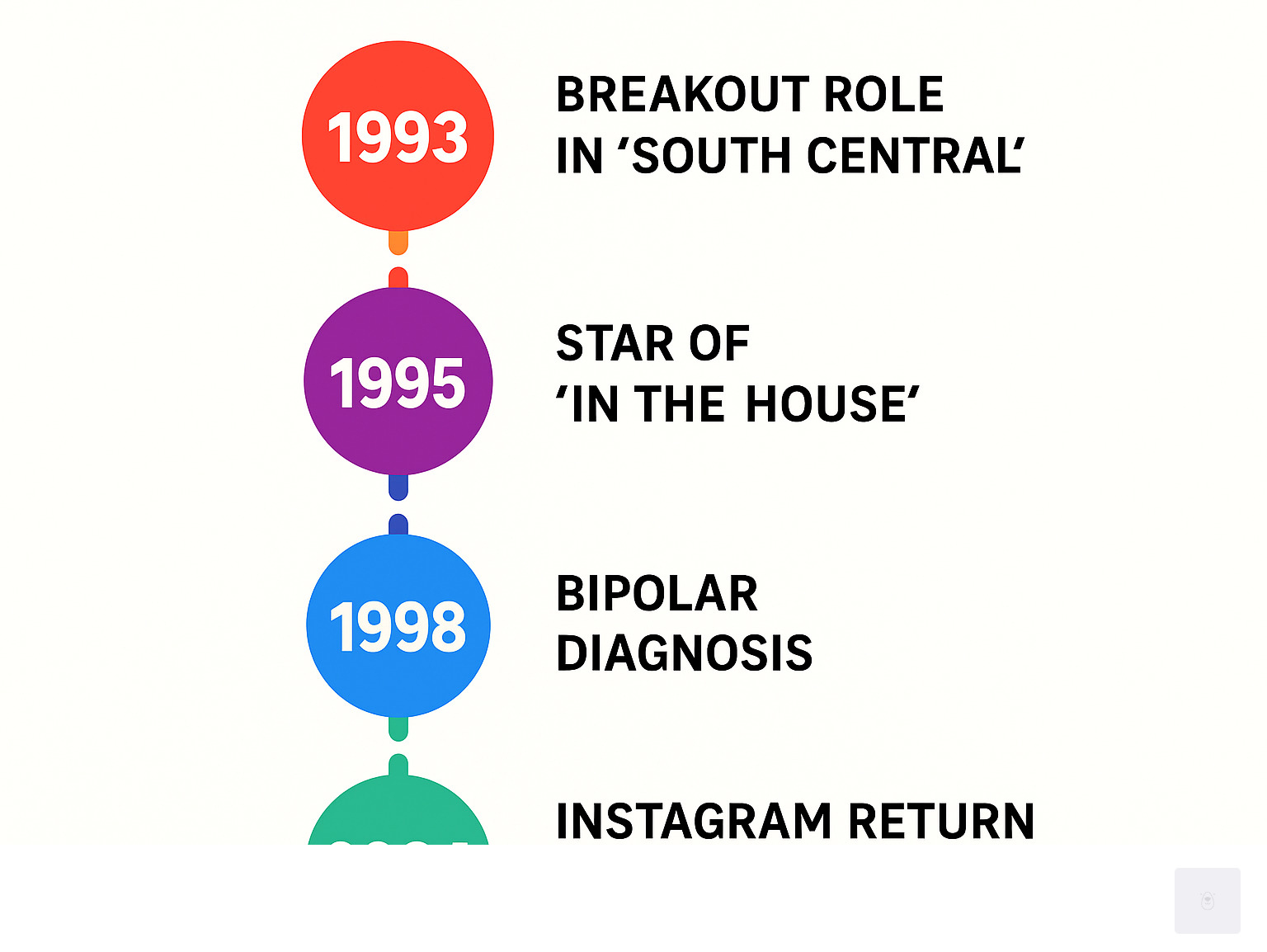
The Rise, Fall, and Hopeful Return of a 90s Television Icon

Maia Campbell is an American actress best known for her starring role as Tiffany Warren on the NBC/UPN sitcom “In the House” from 1995-1999. Here’s what you need to know about her journey:
Key Facts About Maia Campbell:
- Career Peak: Starred in “In the House” with LL Cool J for five seasons
- Notable Works: “South Central,” “Poetic Justice,” “Trippin'”
- Personal Struggles: Diagnosed with bipolar disorder in 1998, faced addiction issues
- Recent Update: Returned to Instagram in 2024 looking healthy after years away
- Family Legacy: Daughter of acclaimed novelist Bebe Moore Campbell
- Current Goal: Wants Tyler Perry to produce her mother’s book “72 Hour Hold”
Maia Campbell’s story reads like a Hollywood script itself – from 90s sitcom stardom to very public struggles with mental health and addiction, followed by what appears to be a promising comeback. Her recent Instagram posts have surprised fans who remember the distressing videos that went viral years ago, showing her in the grip of addiction.
The daughter of celebrated author Bebe Moore Campbell grew up surrounded by creativity and advocacy. Her mother’s work focused heavily on mental health awareness – a topic that would later become deeply personal for Maia herself.
As someone who has witnessed countless celebrity journeys from my front-row seat in New York City’s media landscape, I’ve seen how the entertainment industry can both lift and devastate young talent. Maia Campbell’s story represents both the glittering promise and harsh realities that define so many careers in our industry.

Maia campbell terms to learn:
1. She Was a Breakout Star of the 90s
If you were watching television in the 1990s, chances are you remember Maia Campbell’s infectious smile lighting up your screen. She was everywhere during that golden era of Black television and film – a fresh-faced talent who seemed destined for stardom.
Maia Campbell first caught our attention in 1994 with her role as Nicole on Fox’s South Central. But it was her appearance in John Singleton’s powerful 1993 film Poetic Justice that really put her on the map. Picture this: a young actress holding her own alongside Janet Jackson and Tupac Shakur. That takes serious talent.
Her range was impressive too. She could make you laugh in the 1999 comedy Trippin’ and then pull at your heartstrings in dramatic scenes. This versatility didn’t go unnoticed – she earned a Young Artist Award nomination in 1996, a clear sign that Hollywood was paying attention.
For those of us living in busy cities like New York City, Maia Campbell became a familiar face in our living rooms. She represented that special magic of 90s sitcom fame – when certain actors just felt like part of the family.
Her Most Iconic Role

Without question, Maia Campbell’s star burned brightest as Tiffany Warren on In the House. This NBC/UPN sitcom ran for five seasons from 1995 to 1999, and watching her character grow up on screen was like watching a younger sister come of age.
The show’s premise was simple but effective: former NFL player Marion Hill (played by LL Cool J) rents out rooms in his Los Angeles home. Maia Campbell played his friend’s daughter, and her character became the heart of many storylines. We watched Tiffany steer high school drama, first crushes, and family challenges with a mix of teenage attitude and genuine vulnerability.
Working alongside LL Cool J and Kim Wayans, Maia Campbell proved she could more than hold her own with seasoned performers. Her natural comedic timing and ability to deliver emotional moments made Tiffany Warren feel real and relatable. The chemistry between the entire cast was undeniable – it’s what made In the House appointment television for so many families.
This role truly cemented her place in television history. For five years, she was a constant presence in American households, representing the hopes and dreams of a generation of young Black actresses making their mark in Hollywood.
If you want to dive deeper into her journey during those formative years, a timeline of her career shows just how promising those early days really were.
2. Her Public Battle with Personal Demons
The bright lights of 90s television fame cast long shadows, and for Maia Campbell, those shadows eventually became overwhelming. What started as a promising career took a heartbreaking turn as she began struggling with addiction and mental health challenges that would play out painfully in the public eye.
Those of us who followed entertainment news in the 2000s and 2010s witnessed something deeply troubling. Viral videos began circulating that showed Maia Campbell in moments of profound distress – a far cry from the confident young woman we remembered from In the House. These clips were difficult to watch, especially for fans who had grown up seeing her as a role model.
The most public attempt to address her struggles came in 2012 when Maia Campbell appeared on Iyanla, Fix My Life. Sitting across from Iyanla Vanzant, she opened up about her battles in a way that was both brave and heartbreaking. The appearance gave viewers a glimpse into the complexity of her situation, showing a woman who was clearly fighting demons that went far beyond what cameras could capture.
Her personal struggles inevitably led to legal troubles that made headlines from coast to coast. In 2010, she was arrested for petty theft – a charge that shocked those who remembered her successful acting career. A decade later, in 2020, she faced arrest again following involvement in an illegal street racing competition in Atlanta.
For those of us in New York City’s media landscape, these incidents served as a stark reminder of how quickly fortunes can change in the entertainment world. Each arrest became another painful chapter in a story that had once held so much promise.

Understanding Maia Campbell’s Bipolar Disorder Diagnosis
The root of Maia Campbell’s struggles became clearer in 1998 when she received a diagnosis that would change everything: bipolar disorder. The diagnosis came after she began exhibiting concerning behavior on the set of In the House – behavior that was likely confusing and frightening for everyone involved.
Bipolar disorder causes extreme mood swings, from emotional highs to devastating lows. For someone in the spotlight, managing this condition becomes exponentially more challenging. Every mood shift, every difficult moment, risks becoming public knowledge.
Perhaps the most tragic aspect of Maia Campbell’s journey was her reported refusal to take medication for her condition. This decision, while personal, had far-reaching consequences that affected not just her career but her entire family structure. The situation became so severe that she lost custody of her daughter, Elisha – a loss that must have been devastating for any mother.
Her stepfather spoke publicly about the family’s struggle to support her through her illness, painting a picture of loved ones who felt helpless watching someone they cared about spiral. It’s a scenario that plays out in families across the country, but rarely under such intense public scrutiny.
Maia Campbell’s experience sparked important conversations about mental health awareness that continue today. Her story highlighted the urgent need for better support systems and understanding around mental health conditions. In our industry, we’ve seen how crucial it is to handle such sensitive situations with care – something that falls squarely into the field of effective crisis management PR.
Her public battle became a catalyst for broader discussions about mental health, showing both the devastating effects of untreated bipolar disorder and the particular challenges faced by public figures dealing with personal crises.
3. Her Family Legacy is Rooted in Advocacy and Art
To truly understand Maia Campbell’s journey, we need to look at the remarkable family that shaped her. Her story isn’t just her own – it’s woven into a rich mix of artistic excellence and social advocacy that spans generations.
Her mother, Bebe Moore Campbell, was a literary powerhouse who used her pen to tackle some of America’s most challenging issues. Her father, Tiko Campbell, also contributed to this creative environment. Growing up in this household meant Maia Campbell was surrounded by storytelling, social consciousness, and a deep commitment to making a difference.
The family’s artistic legacy carries forward through Maia Campbell’s daughter, Elisha. Sadly, one of the most painful consequences of Maia Campbell’s struggles was losing custody of her daughter. This loss added another layer of heartbreak to an already difficult journey.
From my perspective here in New York City, where literary circles and media intersect daily, I’ve seen how powerful family legacies can both inspire and create pressure. The Campbell family represents generational talent at its finest – but also shows how personal struggles can affect entire family lines.
Bebe Moore Campbell’s most celebrated works include:
- Your Blues Ain’t Like Mine
- Brothers and Sisters
- Singing in the Comeback Choir
- What You Owe Me
- 72 Hour Hold
The Lasting Legacy of Bebe Moore Campbell
Bebe Moore Campbell wasn’t just any novelist – she was a voice for the voiceless, tackling issues of race, mental health, and family with unflinching honesty. When she passed away in 2006 at just 56 years old, the literary world lost a true champion. The New York Times captured her impact perfectly in their obituary: “Bebe Moore Campbell, Novelist of Black Lives, Dies at 56”.
What makes her legacy especially poignant is her novel 72 Hour Hold. This powerful book tells the story of a mother dealing with her daughter’s mental illness – a narrative that would later mirror her own family’s struggles. The book draws from Bebe Moore Campbell’s personal experiences and her advocacy for mental health awareness.
For Maia Campbell, her mother’s work serves as both inspiration and roadmap. The connection between 72 Hour Hold and her own mental health journey isn’t lost on anyone who knows their story. It’s perhaps no coincidence that Maia Campbell now dreams of seeing this particular book adapted for screen – it would be a way to honor her mother’s memory while sharing a message that could help countless others.
Bebe Moore Campbell’s advocacy work extended far beyond her novels. She championed Mental Health Awareness Month and used every platform available to destigmatize mental illness, particularly in Black communities. Her daughter’s current struggles and hopeful recovery continue this important conversation in ways that are both heartbreaking and inspiring.
4. The Public and Her Peers Have Rallied Around Her
When those heartbreaking viral videos of Maia Campbell began circulating online, showing her struggling with addiction and mental health issues, something remarkable happened. Instead of turning away or making cruel jokes, the public responded with genuine concern and compassion. Fans who had grown up watching her on In the House were devastated to see their beloved Tiffany Warren in such distress.
The outpouring of worry wasn’t limited to anonymous social media users. Maia Campbell’s former colleagues in the entertainment industry also stepped up to show their support. Most notably, LL Cool J, her co-star from In the House, publicly offered to help her get back on her feet. While she reportedly declined his assistance at the time, his gesture spoke volumes about the bonds forged during their years working together on set.
From my years covering celebrity stories here in New York City, I’ve seen how quickly the public can turn on fallen stars. But Maia Campbell’s situation was different. There was something about her vulnerability that touched people’s hearts rather than inviting ridicule. Perhaps it was because so many of us had watched her grow up on our screens, or maybe it was the obvious pain in those viral moments that made people want to help rather than judge.
When Maia Campbell recently returned to Instagram looking healthy and radiant, the response was immediate and overwhelming. The comments section of her posts became a celebration of her apparent recovery. Actress Cherie Johnson simply wrote “smiling so hard,” capturing the joy so many felt seeing her looking well again. Digital creator Arleisha Marshall added, “This just made my day seeing your pretty self on my timeline. Praying life has been treating you so much better beautiful.”
The love didn’t stop there. Industry figures and fans alike expressed their happiness at seeing her change. You can witness A wave of positive reactions that shows just how invested people remain in her wellbeing. It’s a beautiful reminder that sometimes, even in our cynical world, genuine human compassion can shine through.
5. Maia Campbell is Focused on a Positive Future
After years of heartbreak and concern from fans, Maia Campbell surprised everyone with her return to Instagram in early 2024. The photos she shared showed a remarkable change – here was the vibrant, healthy-looking woman we remembered from the 90s, not the troubled figure from those painful viral videos that had circulated for years.
Her April 12th Instagram post marked her first social media presence since 2017, and the change was immediately striking. Maia Campbell appeared clear-eyed, well-groomed, and genuinely happy – a far cry from the distressing images that had dominated headlines. For those of us who’ve witnessed countless celebrity comebacks from our vantage point in New York City’s media landscape, this felt particularly meaningful.
The positive response was immediate and overwhelming. Fans who had worried about her for years suddenly had reason to hope again. Her healthy appearance strongly suggests she’s found her path to sobriety and mental wellness, though she’s kept the details of her recovery journey private.
This isn’t just about looking better – it’s about Maia Campbell reclaiming her narrative and focusing on what comes next. Her return signals someone ready to move forward with purpose and determination.
What’s Next for Maia Campbell’s Career?
Maia Campbell has made her future goals crystal clear, and they’re deeply personal. Her primary ambition is reaching out to Tyler Perry to discuss producing an adaptation of her mother’s powerful book, 72 Hour Hold. This isn’t just any project – it’s a New York Times bestseller that explores mental health struggles through a mother’s eyes, themes that resonate profoundly with Maia Campbell’s own journey.
The choice to focus on this particular project speaks volumes about where she is in her recovery. Rather than simply wanting to return to acting, she’s thinking strategically about meaningful work that honors her family’s legacy while potentially helping others who’ve faced similar struggles.
This goal represents more than a career move – it’s Maia Campbell wanting to transform her painful experiences into something constructive. Her mother was a fierce mental health advocate, and this project would continue that important work while showcasing Maia Campbell’s own resilience.
A return to traditional acting roles certainly remains possible, but her current focus on this deeply personal project suggests she’s approaching her comeback thoughtfully. She’s not rushing back into the spotlight – she’s building toward something meaningful.
For public figures navigating major life transitions, developing a strategic approach to their public image becomes crucial. Maia Campbell’s focus on mental health advocacy and her mother’s literary legacy could form the foundation of a powerful new chapter. Those interested in understanding how public figures can strategically rebuild their careers might find value in exploring More info about building a personal brand.
Maia Campbell’s story reminds us that it’s never too late for a new beginning – especially when it’s rooted in purpose, healing, and hope.
6. Her Story is a Powerful Lesson in Resilience
Maia Campbell’s journey reads like a masterclass in human resilience – a story that has captivated audiences from the busy entertainment hubs of Hollywood to the media-savvy streets of New York City. Her life demonstrates both the dazzling heights and crushing lows that can define a public figure’s experience, especially when mental health challenges enter the picture.
What makes her story so compelling isn’t just the dramatic arc from 90s sitcom stardom to public struggle and back to hope. It’s how she steerd the immense pressures of celebrity while battling bipolar disorder and addiction under the harsh spotlight of public scrutiny. For those of us who have witnessed countless celebrity narratives unfold in real-time, Maia Campbell’s experience stands out as particularly raw and authentic.
Her public vulnerability, though difficult to witness, sparked crucial conversations about mental health awareness that extended far beyond entertainment circles. When those distressing videos went viral, they forced society to confront uncomfortable truths about how we treat public figures in crisis. Her openness about her bipolar disorder diagnosis helped destigmatize mental health discussions, particularly within Black communities where such topics were often whispered about rather than openly addressed.
The power of public support became evident in how people rallied around her during her darkest moments. From LL Cool J’s offers of assistance to the thousands of encouraging comments on her recent Instagram posts, her story illustrates how collective compassion can play a meaningful role in someone’s recovery journey. This outpouring of love wasn’t just celebrity worship – it reflected a genuine desire to see someone overcome adversity and reclaim their life.
Second chances in the public eye are rare commodities, yet Maia Campbell’s recent healthy appearance and renewed goals suggest that redemption is possible. Her current focus on bringing her mother’s important work to screen through Tyler Perry shows how personal struggles can transform into purposeful advocacy. From our perspective here in New York City’s media landscape, we’ve seen how authentic comeback stories resonate more deeply than manufactured celebrity resurrections.
Her narrative serves as a powerful reminder that behind every public figure is a human being navigating life’s complexities. Maia Campbell’s story of triumph, tragedy, and hope continues to unfold, offering inspiration to anyone facing their own battles with mental health, addiction, or simply the challenge of rebuilding after setbacks.
Conclusion
Maia Campbell’s journey reads like a Hollywood screenplay – one filled with early stardom, devastating lows, and what we hope will be a triumphant third act. From her breakout role as Tiffany Warren in In the House to her very public struggles with bipolar disorder and addiction, her story has unfolded before our eyes with all the raw honesty that comes with living in the spotlight.
What strikes me most about Maia Campbell’s narrative is how it reflects the broader human experience. We’ve all watched her evolution from the comfort of our New York City living rooms – first as entertained viewers, then as concerned observers, and now as hopeful supporters. Her recent healthy appearance on Instagram didn’t just surprise her fans; it reminded us all that recovery is possible, even after the darkest chapters.
The outpouring of love from her peers and the public speaks to something beautiful about our collective humanity. When LL Cool J reached out to help, when fans flooded her comments with encouragement, when her story sparked conversations about mental health – these moments showed us at our best. Maia Campbell became more than just a former sitcom star; she became a symbol of resilience that resonated from Hollywood to the busy streets of New York.
Her current goal to bring her mother’s powerful book 72 Hour Hold to the screen through Tyler Perry shows a woman who has found purpose in her pain. It’s a fitting tribute to Bebe Moore Campbell’s legacy and a meaningful way for Maia Campbell to channel her experiences into something that could help others.
From our perspective here at R. Couri Hay Columns, we’ve witnessed countless celebrity stories unfold in the media landscape. Maia Campbell’s journey stands out because it reminds us that behind every headline is a human being deserving of compassion and second chances. Her enduring spirit, despite everything she’s faced, offers hope not just for her future, but for anyone fighting their own battles.
To understand how public figures steer complex narratives and manage their public image during challenging times, you can Learn more about our strategic publicity services. We’re here to help shape stories with both strategic insight and genuine heart.

